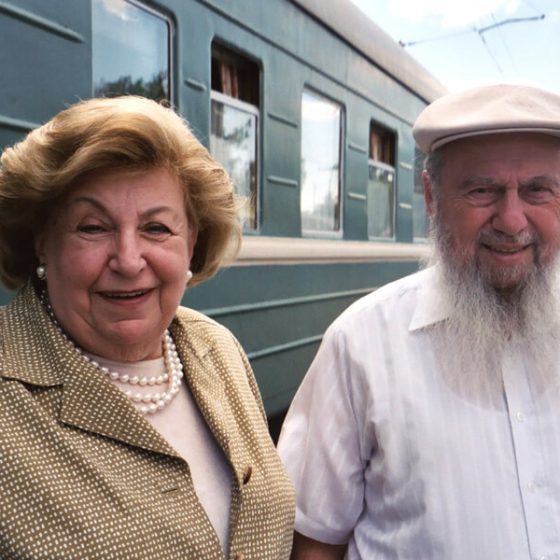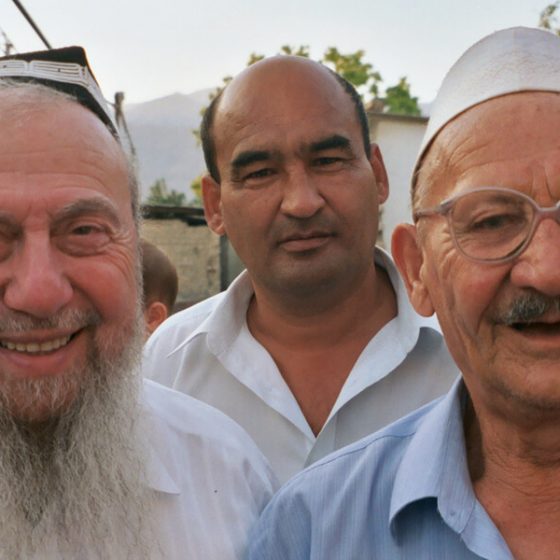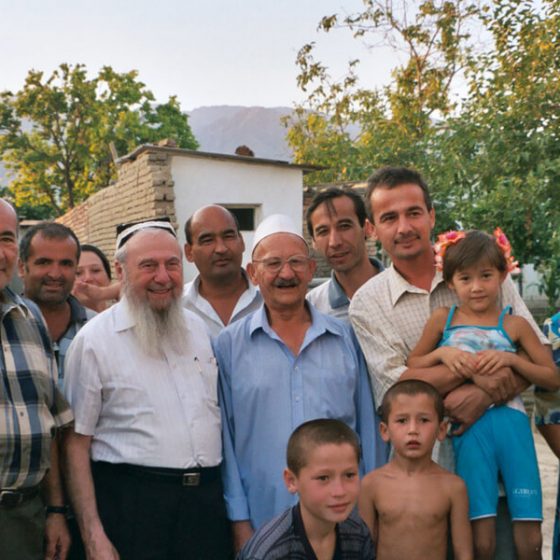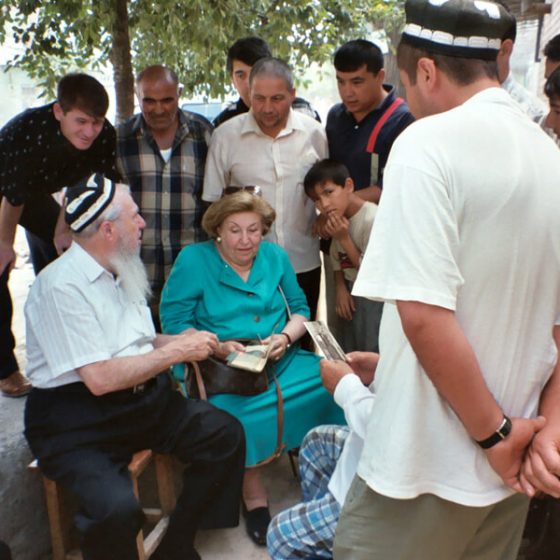Under the Hitler-Stalin pact that was signed by Soviet Foreign Minister Vyacheslav Molotov and German Foreign Minister Joachim von Ribbentrop, the Germans annexed western Poland, prompting thousands of Jews to flee to the eastern region, now controlled by the Soviet Union. (Those who didn’t escape in time perished in the Nazi death camps.)
Poles who fled to the Soviet-ruled part of the country did not escape misfortune either. Stalin’s troops arrested thousands of people, including policemen, soldiers, bureaucrats, judges, and even teachers and priests – anyone accused of being “class enemies.”
Many were executed on the spot, while others — the “lucky ones” — were deported to labor camps in Russia.
Initially some Polish Jews welcomed the arrival of the Russians, viewing them, with good reason from their viewpoint, as a “lesser evil” than the Germans. In fact, some Jews occupied positions of authority in the Soviet-occupied Polish government infrastructure prior to the deportation order.
On the whole, approximately 1.5 million Poles (including Jews) were deported to the Soviet Union.
Many of the deported Polish Jews died in appalling conditions in Siberia, where they were forced to work excessive hours in extreme cold and little food.
However, by September 1941 (three months after Germany attacked the Soviet Union), following negotiations between Stalin and the Polish government-in-exile (in London), an amnesty was granted to the deported Polish citizens (both Jews and Catholics). They were compelled to form a Polish army within the Soviet Union to fight the Germans. Menachem Begin, the future Prime Minister of Israel, was one of these survivors.
All told, about 6 million Poles died in World War II, about half of them Jews, primarily in the Nazi extermination camps of Auschwitz, Treblinka, Majdanek, Belzec, Sobibor and Chelmno. The ones who survived, largely did so through the bizarre (and unintended) intervention of Stalin.
The story of how these Polish Jews survived the war had remained largely unknown until decades after the fact.
In 2007, a Polish-born American documentary producer and director named Slawomir Grünberg released a film called “Saved by Deportation” which told the story of some of the Polish Jews who were spared the death camps by being transported to the Soviet Union. The documentary charts the story of Asher and Shyfra Scharf, two Polish Jews who were sent to the Muslim-dominated regions of Tajikistan and Uzbekistan in Central Asia, as well as Siberia.
Another Jewish deportee, a woman named Sylvia Becker, told the filmmakers of her harrowing tale of fleeing the Germans in western Poland for the east, eventually ending up in a labor camp near the Arctic Circle.
“The knock came in the middle of the night,” she said. “We were allowed just a few moments to gather our belongings. If your name was on the list you were taken to a train depot in horse-drawn wagons. Then, we were loaded onto one of several cattle cars and waited several days, until the train finally headed off to Siberia.”
Another interviewee, Alexander Schenker, the scion of an upper-middle-class Jewish family from Krakow, told of the extremely hard work he was forced to do in Siberian forests, cutting down trees in bitter cold weather.
“Even though it was very difficult, I don’t regret the time I spent in Siberia,” he said, “In some way, strange as it sounds, it was the first time I felt human.”
But Stalin had no humanitarian interest in saving Jewish lives – indeed, his extreme anti-Semitism was well-documented, despite the fact that many of his Bolshevik colleagues leading up to and after the Russian Revolution were themselves Jews.
Robert Conquest, who wrote “Stalin: Breaker of Nations,” said that while Stalin held anti-Jewish views from his Georgian youth, his hatred did not become an obsession until after the defeat of Hitler and the beginning of the Cold War.
“Stalin’s attitude [towards the Jews] seems to have been based in part on what he took to be Hitler’s successful use of anti-Semitic demagogy,” Conquest wrote.
“It was certainly also due to his increasing Russian nationalism, to which he felt, most, or many, Jews were not truly assimilable. And the idea of a special Jewish predilection for capitalism is of course to be found in Marx. He especially opposed Jews who were Bundists [Yiddish-speaking socialists], or religious activists, or ‘cosmopolitans,’ or secessionists, or Zionists, or were agents of American-Israeli organizations.”
Conquest also noted that after Golda Meir arrived Moscow in late 1948 as Israel’s first ambassador (and was warmly received by many Soviet officials), Stalin started another purge of Jews in the country, leading to the notorious “Doctors Plot” of 1952-1953 when Stalin arrested Moscow physicians (most of them Jewish) whom he charged with seeking to poison and kill Soviet leaders on behalf of the British and Americans. [Stalin died in March 1953, which put an end to this episode.].
After Stalin’s death, it was also revealed that Stalin had wanted to deport Russia’s Jews to Birobidjan, a remote part of Siberia, near China’s northeastern border, almost 5,000 miles east of Moscow, according to P.K. Ponomarenko, the Soviet ambassador in Poland.
Stalin defended the decision, citing that he and the Soviet Union were the targets of a “Zionist and imperialist” plot. The proposal was rejected by Marshal Klementi Voroshilov, one of Stalin’s top military officers. Molotov, who had a Jewish wife, also expressed his reservations. Reportedly, an enraged Stalin died soon thereafter, canceling that particular deportation order.
Notwithstanding his virulent anti-Semitism (and his own sanctioning of the killing of Jews within Russia itself), Stalin’s order ironically saved these Jewish lives – indeed, these deportees represented the bulk of Polish Jewry who survived the Nazi Holocaust.
Saved by Deportation: An Unknown Odyssey of Polish Jews (2006)
The New York Times Movies
By Nathan Southern (Link)
As directed by Slawomir Grunberg, this historical documentary discusses one of several deliverances from the Holocaust that occurred during the Second World War. Intriguingly, this particular series of circumstances entailed not an act of heroism or a valiant rescue effort per se (as, say, the Kindertransport did), but a by-product of political annexation.
Though only 300,000 of the 3.3 million Jews in Poland survived the Holocaust, 80% of those individuals found deliverance at the hands of the Soviets, who annexed Eastern Poland in 1939 – and promptly shipped its residents off to Stalin’s gulag labor camps. That might seem a harsh fate to some (with the forced marches, hard labor, exhaustion and bedbugs), though it of course represented a welcome alternative to the torture and death of the camps, prompting at least one of the transports to refer to the gulag camps as “Heaven” in retrospect. In this film, Grunberg interviews seven of those who evaded the concentration camps in this manner; he places a particularly strong emphasis on transport Asher Scharf, who (along with his wife Schyfa) makes an on-camera trip to Chelyabinsk, Siberia – the location that once held the gulags. When the filmmaker and his subjects arrive, they then uncover another irony – the irony that many of the transports, upon being released from the gulags, were promptly shuttled off to Muslim-dominated Tajikstan and Uzbekistan and began new lives there.
Saved by Deportation: An Unknown Odyssey of Polish Jews
Press & Sun-Bulletin
By Monique Lewis
April 13, 2007
SPENCER — If Slawomir Grünberg can make the smallest difference in people’s lives, then it’s worth spending four to five years creating a documentary, he said.
Two of Grünberg’s latest films will premiere this month in the region — one film follows an autistic child prodigy from Vestal and the other recaptures the deportation of a Jewish couple to labor camps in the former Soviet Union.
Grünberg, 56, is an Emmy Award-winning documentary producer, director, cameraman and editor. He regularly turns out one to two films per year and has completed more than 40 television documentaries. Many of his films have been screened in theaters and film festivals worldwide.
Grünberg, of Spencer, said his projects are either something he discovers on his own or were introduced by people who ask him to bring to life a particular issue. The last local documentary he produced and directed was “Borderline: The People vs. Eunice Baker,” which tells the story of a borderline mentally handicapped woman who was sentenced to 15 years to life in prison in the death of a young child in Owego. The murder conviction was later overturned.
Grünberg’s second documentary, “Saved by Deportation: An Unknown Odyssey of Polish Jews” is scheduled to screen April 19 at Cornell Cinema in Ithaca. It opens at a train station in Lvov, Poland, where Asher and Shifra Scharf begin their dramatic journey to retrace their deportation in 1940. The elderly Chasidic Polish Jews revisit their places of exile, unlocking experiences and events from six decades ago.
Co-producer and filmmaker Robert Podgursky asked Grünberg if he would be interested in directing the film, because of his family’s experience of Jewish deportation.
“It just so happened that my father, who is also Jewish, survived in Russia,” Grünberg said. “I decided to work with (Podgursky) on this project and it took seven years. It also tells the story of my father in some way, Karol Grünberg.”
Slawomir Grünberg said it took a long time to gather funding and find people willing and able to travel to Siberia and Central Asia to retrace their history. He found the Scharfs in Brooklyn.
Grünberg’s interest in photography began at the age of 15. He produced his first film at age 24 and attended the Polish Film School in Lodz, Poland. He graduated at age 30, moved to the United States and taught film and television for eight years at various locations, including Cincinnati, Chicago, St. Louis and Ithaca College.
“For me, projects start very small and innocent, and they seem to be very low key,” Grünberg said. “You see this small work which you do can make a difference. You can see how powerful the camera can be, and that for me is a really good indication of why I’m doing this.”
Cornell Cinema
Cornell Daily Sun
By Mark Rice
April 16 2007 (Link)
At the beginning of Saved by Deportation, a documentary by Slawomir Grunberg, one of the films’s featured subjects, Asher Scharf, reflects on his incredible journey and comments: “When it’s meant to be that you should be alive, you stay alive.” This simple quote is a summary of the enduring faith of Asher and his fellow peers who survived the dark years of World War II and the Holocaust through a strange twist of fate.
After the initial Nazi invasion of Poland, the nation was partitioned by the Soviet and German regimes. In 1940, Stalin ordered the deportation of numerous Poles under his control to the Soviet Union’s interior in order to work in labor camps. Of the approximately 500,000 Polish citizens transported, 200,000 were Polish Jews. The deported wound up in numerous labor camps spread across the Russian interior, where the motto was: “You get used to this life, or you drop dead.”
However, this harsh policy became a gift of life for many of the Jewish prisoners who were saved from the Nazi death camps. When the camps granted them freedom, the refugees had to embark on foot, train or any other means through Central Asia in search of a way home to safety. Along their journey, the prisoners fought off disease and hunger, but remarkably managed to raise their children, get married and, most importantly, maintain their faith.
The idea for this — in the words of the director — “biblical seven year” project was posed to Grunberg by Robert Podgursky, a co-producer of Saved by Deportation whose father was deported to the labor camps. Grunberg, a Polish Jew himself whose father also survived the Nazis in World War II, became intrigued with the project. In a recent interview, Grunberg commented: “In some ways this film tells his story too.” Grunberg’s efforts have yielded a wonderful, provoking film that has won the Audience Award for Best Documentary at the Washington Jewish Film Festival.
The film’s strongest asset is Grunberg’s decision to revisit the sites of the Polish Jews’ exodus across Central Asia with Asher and Shifra Scharf — a married couple now in their 80s who survived the experience. It’s one thing to watch a documentary that features interviews and archival footage. It’s a completely different experience when you can watch an 80-year-old man visit the same room in Russia where he huddled against the cold winter, or when Asher and Shifra revisit the places of their courtship and marriage that took place in Samarkand, Uzbekistan. As Asher and Shifra reach out and interact with people who — 60 years later — live and work in the same coal mines, apartments and shelters, they also reach out to us as an audience.
A constant theme through the film is the strange nature of fate. Originally, the Polish Jews sent to Siberia believed that they were issued a death sentence, when in fact it was a roundabout gift of life. This strange result is even more difficult to fathom considering that the exiled Jews had no role in planning their own salvation. On the contrary, many initially tried to escape the deportation. It is a tremendous question of faith to ask why one has been saved when so many others have not. Even more amazing is how so many survivors look back on the hard experience as a gift. One survivor commented: “I think that it is only there that I became a human being.”
A secondary theme is present in Saved by Deportation, one that even Grunberg was surprised to discover as he filmed the documentary. It is the remarkable human kindness that often coexists with our history’s darkest moments. All of the survivors note the incredible charity that they encountered during their exodus through present-day Uzbekistan and Tajikistan. 60 years later, Asher and Shifra encounter the same kindness in nations which our media and popular sentiment suggest would be the most hostile for Westerners, let alone Orthodox Jews. In one of the film’s most touching scenes, Asher exchanges stories, prayers and tales of his grandchildren with a Tajik man. Like the subject matter of Saved by Deportation, it is a wonderful, human proof of genuine faith and kindness, even in the face of extreme differences and challenges.
Cornell Cinema will be showing Saved by Deportation on Thursday, April 19 at 7:15 PM in WSH with local filmmaker Slawomir Grunberg, editor Christopher Julian and soundtrack composer Robby Aceto.
Toronto Jewish Film Festival News
By Larry Anklewicz
May 2007 (Link)
The films this year cover a wide range of topics and subject matter…… Every year there are a few films that seem to strike especially close to home…. Saved By Deportation is the first film I have seen about the Jews who fled the Nazis and wound up in the Soviet Union. They were arrested and eventually ended up in the Soviet republics of central Asia. This saved the lives of over 200,000 Polish Jews, including my own parents.
Film – Saved by Deportation
The Jewish Week
March 10 2007
In relatively recent historiography, Stalin has been re-assessed as an egotistical megalomaniac and ruthless tyrant on par with his arch nemesis, Adolph Hitler. It has been argued that his mass executions of political dissenters and rebels was as ruthless and inhumane as anything Hitler did. The difference, at least in broad strokes, was that Stalin’s genocide wasn’t racially motivated, but rather political. In a new documentary by Slawomir Grunberg and Robert Podgursky, which makes its New York debut at Makor, “Saved by Deportation” tells the bleak story of Jewish survival under Soviet oppression. Of the 500,000 Poles deported from the country’s eastern provinces, under Soviet control, 200,000 were Jews. They slaved away in forced labor camps in Siberia, among other places, but ultimately survived the war and built life anew. The same can’t be said of Poland’s western Jews, who under Nazi occupation had their grim fate sealed almost immediately. Grunberg’s film documents this contrast, and the director will discuss it after the film’s screening. — Makor, 35 W. 67th St. (212) 415-5500. Wed., Mar. 14, 6 p.m. $15.
High Definition at the 17th Washington Jewish Film Festival
Washington City Paper
By Mark Jenkins
December 1 2006 (Link)
Documentaries that depict refugees and road trips are common in Jewish film festivals, but as Saved by Deportation demonstrates, there are still unexpected stories within this much-explored territory. The protagonists of this documentary are people who feared they were on the wrong side of the frontier when Germany and the Soviet Union divided Poland in 1939. Some 500,000 Poles, about 200,000 of them Jewish, were sent to work camps in Siberia, where life was hard but survivable. In 1941, when the Germans and the Soviets went to war, the latter allied with the Polish government in exile, and the Poles behind Soviet lines were set free. Most headed south, where they made new lives among the predominantly Muslim population of Tajikistan and Uzbekistan. Director Slawomir Grünberg uses Asher and Schifra Sharf, a couple that eventually settled in Brooklyn, as his guides. Their visit to the lands that sheltered most of the Polish Jews who survived World War II is poignant, yet not without joy. At their 58th wedding anniversary, the Sharfs can show video of the city where they married, which is neither Krakow nor New York but Samarkand.
Interview by David Horowitz
The Washington DC International Jewish Film Festival blog
December 3 2006
Saved by Deportation co-producer Robert Podgursky speaks with WJFF blog Editor David Horowitz
I understand that your father went through this experience, and that was your inspiration for this film, but you did not use his story specifically in the film?
I did not use him personally in the film because he was very young, he was only four years old when World War II broke out, and about 10 when the war was over. Even though he remembers quite a bit, we wanted to use older subjects for the film because they would have more substantive memories and different kinds of experiences than a young child, like my father.
Audience Reactions
Dear Slawomir, Warm greetings from Melbourne. We are wrapping up our festival (Festival of Jewish Cinema in Australia) and I want to thank you again for participating at our event with Saved By Deportation. I was very pleased to be able to present your film on several levels. As you may appreciate, we preview many, many documentaries each year dealing with WW11 subjects, but its not often we come across one that deals with such an important but hitherto overlooked subject Everyone was, of course, impressed and pleased to have seen your film. During the festival I received a lot of positive feedback and phone calls. They fell in two categories, my parents generation, who experienced the events relayed first hand, and my generation, who were both surprised and pleased to learn how our parents came to survive. As I may have already mentioned, the film mirrors my late father’s own journey, from the time he was deported to a Gulag somewhere near or north of Syktyvkar (misspelt I think ? – do you know anything about this camp?) to his release to somewhere warmer. I wish you lots of success with this film, and would like to take this opportunity to encourage you to make more Jewish films, should you need any such encouragement.
Kind regards,
Les Rabinowicz
Festival’s Director, Festival of Jewish Cinema in Australia
I thought that you might like to know that my son Matthew and parents viewed a DVD of Saved by Deportation recently. As a result of your efforts, they had the unique experience of sharing my dad’s (and the Polish Jews) Shoah history, visualized. It was very moving for them both.
I immediately viewed Saved By Deportation. Fascinating. Asher is like Santa Claus. I understand that humor, that world view, that attitude of revitalization. I grew up among the same people. I recognized some of the observations. The bedbugs. That was one of the first things that I recall my dad telling me as a child. They tormented him. The thermometer. The trees. He also cut lumber. He once told me his opinion of why Communism would never work. He said that they had an unrealistic quota of trees that they had to fell. The authorities would mark the downed trees. Due to the fact that they could not meet the quota, they would just cut away the mark and the authorities would recount the tree the next day. He also caught malaria, nearly died. He found some quinine and survived. They lived in Stalinabad, too. … For me the most amazing thing about the film was actually seeing the Siberian barracks. Finally, after all these years, an image. My dad also left relatives behind when they fled Ulanow. He said goodbye to his grandparents, both in perfect health, in their late seventies and early eighties. At the time, they thought that they could not have made the trip. Maybe they were right and maybe they were wrong. … I loved the fact that you ended the film with a wedding (a la The Godfather, but with quite a twist). I always go to the end of Shoah literature first. I have to see, read of the liberation, survival before getting into the material. It’s all part of my essential “Am Yisroel Chai”.
Cordially,
Elaine






